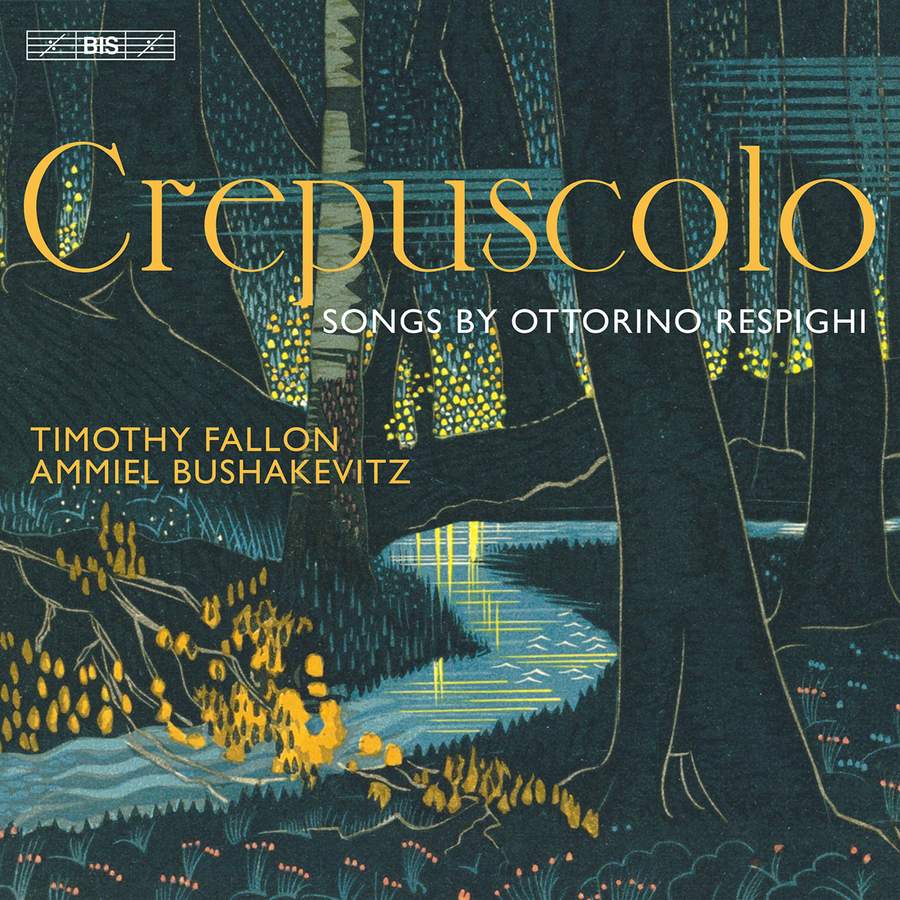Crepuscolo: Songs by Ottorino Respighi (Timothy Fallon)
View record and artist detailsRecord and Artist Details
Genre:
Vocal
Label: BIS
Magazine Review Date: 10/2022
Media Format: Super Audio CD
Media Runtime: 74
Mastering:
DDD
Catalogue Number: BIS2632

Tracks:
| Composition | Artist Credit |
|---|---|
| Deità silvane |
Ottorino Respighi, Composer
Ammiel Bushakevitz, Piano Timothy Fallon, Tenor |
| (6) Melodie, Movement: In alto mare (E. Panzacchi) |
Ottorino Respighi, Composer
Ammiel Bushakevitz, Piano Timothy Fallon, Tenor |
| Contrasto |
Ottorino Respighi, Composer
Ammiel Bushakevitz, Piano Timothy Fallon, Tenor |
| (L') Ultima ebbrezza |
Ottorino Respighi, Composer
Ammiel Bushakevitz, Piano Timothy Fallon, Tenor |
| (6) Melodie, Movement: Abbandono (A. Vivanti) |
Ottorino Respighi, Composer
Ammiel Bushakevitz, Piano Timothy Fallon, Tenor |
| Stornellatrice |
Ottorino Respighi, Composer
Ammiel Bushakevitz, Piano Timothy Fallon, Tenor |
| (5) Canti all'antica |
Ottorino Respighi, Composer
Ammiel Bushakevitz, Piano Timothy Fallon, Tenor |
| Store breve |
Ottorino Respighi, Composer
Ammiel Bushakevitz, Piano Timothy Fallon, Tenor |
| (6) Liriche, Movement: Nel giardino (Rocchi) |
Ottorino Respighi, Composer
Ammiel Bushakevitz, Piano Timothy Fallon, Tenor |
| (6) Liriche, Movement: Pioggia (Pompilli) |
Ottorino Respighi, Composer
Ammiel Bushakevitz, Piano Timothy Fallon, Tenor |
| Lagrime |
Ottorino Respighi, Composer
Ammiel Bushakevitz, Piano Timothy Fallon, Tenor |
| (4) Arie Scozzesi |
Ottorino Respighi, Composer
Ammiel Bushakevitz, Piano Timothy Fallon, Tenor |
| (6) Liriche, Movement: O falce di luna calante (G. D'Annunzio) |
Ottorino Respighi, Composer
Ammiel Bushakevitz, Piano Timothy Fallon, Tenor |
| Notturno |
Ottorino Respighi, Composer
Ammiel Bushakevitz, Piano Timothy Fallon, Tenor |
| Nebbie |
Ottorino Respighi, Composer
Ammiel Bushakevitz, Piano Timothy Fallon, Tenor |
Author: David Patrick Stearns
With every new exposure to Respighi’s vocal music – whether opera or song – I find that his much better-known orchestral works fade in significance, especially with this new cross section of the composer’s songs. Respighi songs have turned up here and there in mixed-composer recitals, and Channel Classics has issued a three-volume complete edition (9/97, 11/06) – valuable indeed but with some vocal ups and downs. Even more than Ian Bostridge’s Respighi collection (Pentatone, 11/21), this newcomer makes a great case for a single-disc collection thanks to a smart sense of musical variety in the sequencing plus the passionate, elegant performances by lyric tenor Timothy Fallon and his longtime collaborator, pianist Ammiel Bushakevitz.
Respighi was at his most distinctive in through-composed songs in the spirit of Debussy, starting in this collection with Deità silvane (texts by Antonio Rubino) with no individual stanzas, allowing the music to unfold fluidly, though maintaining a clear poetic narrative amid their purposefully sumptuous harmonies by use of short, pithy motifs that often do double duty for structural purposes and descriptive text-painting. With diaphanous texts by Rubino, Ada Negri and Annie Vivanti, we’re in a lush, ornate, stylised world, similar to that of visual artists Maxfield Parrish and François-Louis Schmied (whose woodcut graces the booklet’s cover). At times, the music has a sweep and momentum that make stanza divisions all but irrelevant. However, a collection of such music can be hard to sustain even amid ecstatic performances.
Thus, about one third into the collection, the spare, text-centred world of Monteverdi is evoked in Cinque Canti all’antica, showing that saturated harmonies weren’t essential for Respighi to do some of his best work. Later in the programme, the language suddenly turns to Scottish dialect with Quattro Arie scozzesi, where plain-spoken texts by Robert Burns among others are treated to descriptive keyboard-writing with virtuoso, sleight-of-hand key changes. The recital ends with one of the composer’s greatest hits, ‘Nebbie’ (‘Mists’), which is unusually lachrymose for Respighi (the Negri words are about grey skies, bare trees and crows) but has plenty of musico-dramatic punch.
All of it is recognisably Respighi, the contrasts fostering appreciation of his different modes of composition. The question is (ancient and folk songs aside), how important is the music’s considerable artifice? Ian Bostridge’s lean tone, scrupulous diction and innate sense of objectivity made me hear the music as being ‘of its time’, representing well-meant posturing from the pre-modernist mid-20th century. Fallon convinces me of the opposite: he brings the songs into the present with performances whose emotional immediacy seems suited to inner lives of the 21st century, sometimes suggesting a fevered heart (yes, we still have those) whispering to itself.
Fallon is no newcomer – he made a cameo appearance on Marek Janowski’s Tristan und Isolde (Pentatone, 2/13), among other recordings – but maintains a youthful sensibility that takes the poems at face value, never looking outside of them, aided by a warm, Italianate tone that lends itself to the musical simplicity of the Scottish folk songs as well as the operatic histrionics of ‘Stornellatrice’ (‘Balladeer’). Many of these songs are known – when known at all – in versions for voice and orchestra. Bushakevitz’s sonority and sense of comprehension suggest the lilac-scented, silk-upholstered parlours seen in Luchino Visconti movies, but make such a good case for the more distilled piano versions that, at least for the moment, you wouldn’t want to hear the music any other way.
Discover the world's largest classical music catalogue with Presto Music.

Gramophone Digital Club
- Digital Edition
- Digital Archive
- Reviews Database
- Full website access
From £8.75 / month
Subscribe
Gramophone Full Club
- Print Edition
- Digital Edition
- Digital Archive
- Reviews Database
- Full website access
From £11.00 / month
Subscribe
If you are a library, university or other organisation that would be interested in an institutional subscription to Gramophone please click here for further information.




